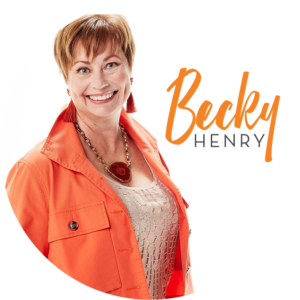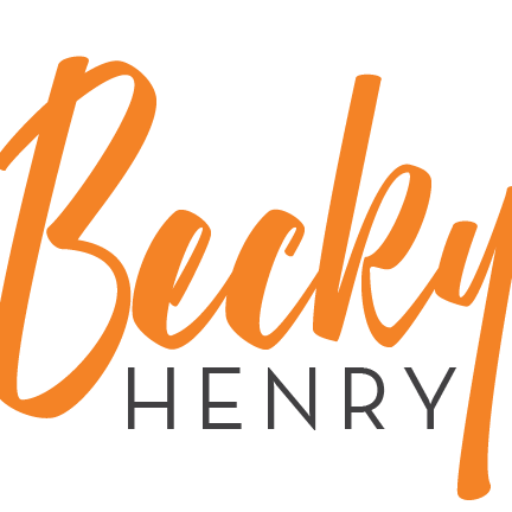 During what feels like a lifetime ago while trying to support a loved one in eating disorder treatment, I had almost no support. It was in the dark ages of treatment research in which parents (especially mothers) were seen as the cause. Not super helpful as you can imagine. As a result I was isolated, without support, had no one helping me to figure out what to do or not do, what to say or not say. My life was put on hold, I called the insurance company daily (seriously I did for 1 year…I know it sounds nuts…but the squeaky wheel gets the grease), my marriage was impacted, my health took some real hits, my sanity all but disappeared. Some days in my depleted state it was all I could manage after putting kids on the bus and calling the insurance company to get food in the house and do some laundry. A couple of days I couldn’t get out of bed. Let’s just say, I was not an effective caregiver, wife, mother, friend, daughter, citizen, human. The isolation, fear, sadness and lack of help had stripped away everything and left me a shell of my former self. And yet I was tasked with providing the in home support in between the 50 minute once a week therapy sessions…Doesn’t take a rocket scientist to figure out that this was not a real effective model for anyone involved. Although I know a rocket scientist and I have a funny story about him and trying to deal with a woodpecker at 6am that didn’t go so well…so, there’s that.
During what feels like a lifetime ago while trying to support a loved one in eating disorder treatment, I had almost no support. It was in the dark ages of treatment research in which parents (especially mothers) were seen as the cause. Not super helpful as you can imagine. As a result I was isolated, without support, had no one helping me to figure out what to do or not do, what to say or not say. My life was put on hold, I called the insurance company daily (seriously I did for 1 year…I know it sounds nuts…but the squeaky wheel gets the grease), my marriage was impacted, my health took some real hits, my sanity all but disappeared. Some days in my depleted state it was all I could manage after putting kids on the bus and calling the insurance company to get food in the house and do some laundry. A couple of days I couldn’t get out of bed. Let’s just say, I was not an effective caregiver, wife, mother, friend, daughter, citizen, human. The isolation, fear, sadness and lack of help had stripped away everything and left me a shell of my former self. And yet I was tasked with providing the in home support in between the 50 minute once a week therapy sessions…Doesn’t take a rocket scientist to figure out that this was not a real effective model for anyone involved. Although I know a rocket scientist and I have a funny story about him and trying to deal with a woodpecker at 6am that didn’t go so well…so, there’s that.
As you may have read in the 1st edition of my book, “Just Tell Her To Stop: Family Stories of Eating Disorders” I share stories of many families as well as how I  got help during my coaching training program. There I learned that I could choose my perspective and that gave me the support to fill my cup and practice self-care so I could stop being erased and be a more effective human.
got help during my coaching training program. There I learned that I could choose my perspective and that gave me the support to fill my cup and practice self-care so I could stop being erased and be a more effective human.
Parents and other family caregivers of those with eating disorders are typically depleted beyond description. The stories I hear of being so exhausted, feeling erased, feeling hopeless and helpless are heartbreaking.
Individual clients and group clients tell me that it took them a very LONG TIME to understand the connection between practicing self-care and how that helps their child. It’s very very counter-intuitive and goes against our maternal instincts to save our child.
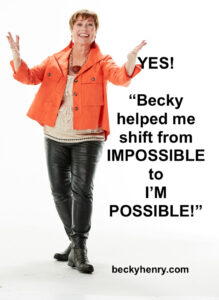 What I have seen in the over 16 years of coaching parents and other family caregivers of those with eating disorders is that every single time a client worked with me 1:1 and really made the effort to learn how to practice self-care, it made it possible to do their parallel process and heal. Once they did their own parallel process, their kids/family members dramatically improved and some have fully recovered. It takes a while, and self-care really pays off for everyone.
What I have seen in the over 16 years of coaching parents and other family caregivers of those with eating disorders is that every single time a client worked with me 1:1 and really made the effort to learn how to practice self-care, it made it possible to do their parallel process and heal. Once they did their own parallel process, their kids/family members dramatically improved and some have fully recovered. It takes a while, and self-care really pays off for everyone.
The ‘parallel process’ is not for the faint of heart. It takes a willingness to dig deep and tap into reserves. This means that self-care is vitally important. Remember the oxygen mask lecture on the airplane? Doing our parallel process also includes working on beliefs, one’s own ability to set AND follow through with loving boundaries. Tackling one’s own levels of distress and tolerating a child’s distress are brave and bold and take support. These are but a few of the many aspects of cleaning up our side of the street to be able to effectively support a loved one facing a life threatening eating disorder.
Since the Weekly Online Group Support is $19.97 a month for one hour weekly video calls and my 1:1 coaching is currently (2019) $500 a month for the 60 minute once a week calls, these are not accessible to everyone who needs them. And, I can only fit 6-7 people in my 1:1 coaching practice and the Group Support is limited in size. So, I created the HUG Kits to provide; Hope Understanding and Guidance for family caregivers that is more accessible to many family caregivers.
The HUG Kits are a very discounted way for parents to get my information and support. I offer another 20% off for non-profits and treatment centers who
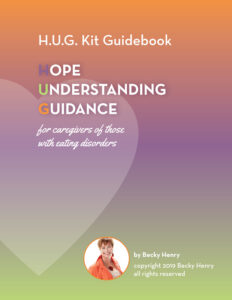
HUG Kit Cover
purchase 10 or more HUG Kits at one time so you can provide these for your families.
Ideas to support families who need support:
- Non-profits & treatment centers can consider purchasing 10 or more to help families they serve. The HUG Kits are most effective when the parents have weekly accountability and support to watch the videos and write in the guidebooks. Life is so challenging and stress-filled that this support is necessary to help people to make the time to watch the videos and do the parallel process in the guidebook.
- Friends & members can purchase HUG Kits or any services as a gift.
I also offer tons of FREE resources for families.
- My blog – if you read every blog post you will get a lot of the information that is in my HUG Kits. beckyhenry.com/blog/
- My YouTube Channel – Hundreds of videos on several playlists to support family members at no cost. https://www.youtube.com/channel/UC0Nd5gBNhPxgnqscj0rgu_Q…
- Monthly FREE Group Phone Support – 1st Wednesday of each month at 5pm Central https://beckyhenry.com/group-phone-support/
Keeping eating disorder parent support and eating disorder family support accessible matters to me. This work since 2003 has been a labor of love born out of a passion to change a broken system. I’m always open to discussing new ideas to make support more available to more family caregivers of those with eating disorders. There are other people who support families in other ways, I’m so grateful to know about so many resources including (but not limited to):
- Ibbits Newhall Consulting where families get help to navigate the treatment journey
- Wendy Wright Counseling – therapeutic support of families
My coaching focus is helping parents and other family caregivers to get their oxygen masks firmly in place and giving them the accountability and peer support to be able to be calm, compassionate, confident caregivers. I don’t do therapy, I refer to hundreds of therapists and RD’s across the USA and world. I encourage my clients to always to family therapy with a qualified family therapist who will see the FAMILY as the client.
The co-active coaching model I use allows me to accompany my clients to find the answers within. I do not work harder than my clients. I work as hard as they do to help them learn to fish.
Not a good fit for coaching – I will refer to therapeutic colleagues:
- Want someone to fix their loved one
- Cannot do their own parallel process
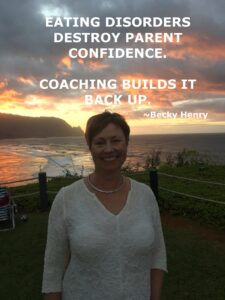
- Have had significant trauma
- Need to have insurance pay for your support
- Looking for someone to find you the best fit for treatment
My ideal clients who will benefit from coaching:
- Want Accompaniment
- Welcome Support in learning how to be effective
- Thrive with Accountability
- Need someone who gets it and won’t judge them
- Use the Tools they choose each week
- Tap into the Resources I share
- Do their parallel process
- Know that I won’t fix this for them
- Accept that it’s not my job to make their loved one well
- Want to become calm, compassionate, confident caregivers
It used to be I was the only eating disorder parent coach in the USA or the world for that matter. Now there are more and more people who are wanting to do what I do. I welcome this. There are over 30 million people in just the USA who have eating disorders and every one of them has at least one person who is losing sleep worrying about them who deserves support. I may not be the best fit for you, my coaching model may not be your cup of tea. Please know that due diligence is needed to vet a coach’s experience and training.
If you want to know what my clients have gotten from our coaching, you can read my testimonials page here. Many have said to me that our work together ‘changed their lives’ and they are ‘forever grateful.’
You are welcome to contact me for a free consultation to see how my coaching model works. Suffering is not necessary.
